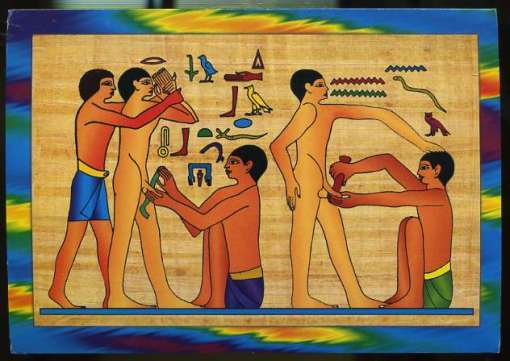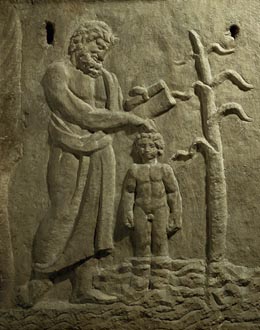
 |
Freethought & Rationalism ArchiveThe archives are read only. |
|
|
#71 | ||||
|
Veteran Member
Join Date: Aug 2004
Location: Orlando
Posts: 2,014
|
Hi Iskander,
An example of a positive doctrine that early Christians could have believed in is the Nicene Creed of 325: Quote:
Again, Early Christians having no positive doctrines makes sense if Christianity simply started as an anti-priest/ruling class political movement and not really a religious movement with real theological differences from Judaism. Warmly, Jay Raskin Quote:
|
||||
|
|
|
|
#72 | |||
|
Veteran Member
Join Date: Nov 2005
Location: United Kingdom
Posts: 3,619
|
Quote:
Assumption: The following statement assumes that an early conflict existed between the early Christians and the Judaic priesthood. Statement: The statement under consideration says that the conflict between early Christianity and Judaic priesthood was caused by the absence of any significant positive religious statement by the early Christians. Conclusion: Given that the assumption stipulates the existence of conflict, the following explains its origin. The conflict between early Christians and the Judaic priesthood was caused exclusively by political differences. NB Are we considering the existence of Jesus as presented to us in the Greek Testament? For the purpose of our conversation what should we understand for early Christianity? |
|||
|
|
|
|
#73 | ||
|
Veteran Member
Join Date: Aug 2004
Location: Orlando
Posts: 2,014
|
Hi Iskander,
I'm trying to limit the discussion to the earliest break between Chrisitanity and Judaism. We have to imagine how this break occurred and the new identity of Christianity came about. This is my blog on the subject   What really separated Christianity and Judaism in the beginning was not any positive doctrines. I should like to propose that a man named Jesus coming back from the dead, Jesus being a son of God or a prophet or a magician with powers from God were all insignificant later issues. It seems to me that the original breaking issue was circumcision. Imagine that Baptism was just originally a gimmick to get gentiles interested in Judaism. It is a nice cleansing ritual developing out of utensil cleansing rituals. If the body is a utensil that you use like a knife or spoon, why not wash it too and bless it with a prayer? This is a very nice gimmick for getting the others interested in Judaism and presenting it as a healthy practice. However, the real mark of Judaism is the cutting of the foreskin. In order to become Jewish you have to be circumsized. That's the mark or the sign that you are a Jew. It is the physical proof of your agreement to the Hebrew covenant with God and all other Jews. The Jewish revolt against the Romans in the First century needed help. Romans probably outnumbered Jews at least 10 to 1. Therefore the Jews needed help to free themselves from the heavy taxation and political control of the Romans. They needed to recruit Jews from outside the ranks. Increasing the number of Jews was a strategy for liberation. It was purely a strategic move to serve a political goal. The problem was that it was easy to attract people. Judaism had a beautiful temple, the idea of an invisible or unknown God who would protect you, and it had the pleasurable watery baptism ritual. The problem was that few gentiles would want to take the next necessary step after baptism of cutting off the foreskin of their penis. Christianity begins with the more practical militant Jews who don't care about the foreskins and Jewish tradition. For them the baptism ritual is enough. Their attitude is "Dunk them under the water and they're in, they're one of us. They can fight on our side." They can argue that if the Jews make someone a king by anointing them with a little oil on the head, can't just dipping someone under the water make someone a Jew? Is not all things possible with God? This is the founding idea of Christianity. the idea that baptism can be a substitute for circumcision. It represents the most important and earliest argument in the writings of Paul and it is symbolically represented in the Baptism of Jesus, where a Galilean gentile suddenly gets magical powers and becomes a Jew (a son of God) simply by undergoing the Baptism ritual. (Making Jesus a Jew to begin with is a Second century afterthought Christianity begins with Jews who want to devalue the circumcision ritual and add value to the baptism ritual. In a certain sense, the transformation of the baptism ceremony into a full initiation ceremony is all that Christianity was in the beginning and the rest of Christian history is footnotes. What really separated Christianity and Judaism in the beginning was not any positive theological doctrines. I should like to propose that a man named Jesus coming back from the dead, being a son of God, or a prophet, or a magician with powers from God were all insignificant later issues. It seems to me that the original issue was circumcision. The original Baptism ritual was originally a gimmick to get gentiles interested in Judaism. It is a nice cleansing ritual developing out of utensil cleansing rituals. If the body is a utensil that you use like a knife or spoon, why not wash it too and bless it with a prayer? This is a very nice gimmick for getting the others interested in Judaism and presenting it as a healthy practice. However, the real mark of Judaism is the cutting of the foreskin. In order to become Jewish you have to be circumsized. That's the mark or the sign that you are a Jew. It is the physical proof of your agreement to the Hebrew covenant with God and all other Jews. The Jewish revolt against the Romans in the First century needed help. Romans probably outnumbered Jews at least 10 to 1. Therefore the Jews needed help to free themselves from the heavy taxation and political control of the Romans. They needed to recruit Jews from outside the ranks. Increasing the number of Jews was a strategy for liberation. It was purely a strategic move to serve a political goal. The problem was that it was easy to attract people. Judaism had a beautiful temple, the idea of an invisible or unknown God who would protect you, and it had the pleasurable watery baptism ritual. The problem was that few gentiles would want to take the next necessary step after baptism of cutting off the foreskin of their penis. Christianity begins with the more practical militant Jews who don't care about the foreskins and Jewish tradition. For them the baptism ritual is enough. Their attitude is "Dunk them under the water and they're in, they're one of us. They can fight on our side." They can argue that if the Jews make someone a king by anointing them with a little oil on the head, can't just dipping someone under the water make someone a Jew? Is not all things possible with God? This is the founding idea of Christianity. the idea that baptism can be a substitute for circumcision. It represents the most important and earliest argument in the writings of Paul and it is symbolically represented in the Baptism of Jesus, where a Galilean gentile suddenly gets magical powers and becomes a Jew (a son of God) simply by undergoing the Baptism ritual. (Making Jesus a Jew to begin with is a Second century afterthought Christianity begins with Jews who want to devalue the circumcision ritual and add value to the baptism ritual. In a certain sense, the transformation of the baptism ceremony into a full initiation ceremony is all that Christianity was in the beginning and the rest of Christian history is footnotes. Warmly Jay Raskin Quote:
|
||
|
|
|
|
#74 | |
|
Veteran Member
Join Date: Nov 2005
Location: United Kingdom
Posts: 3,619
|
Quote:
I don’t think that the gospels give any justification to the claim made by the RCC that Jesus founded the Roman Church , appointed Peter as his vicar on earth and that by giving the ‘keys’ away he abdicated his divine crown. I don’t think that Jesus meant anything, but to bring comfort to his fellow citizens during their lifetime by the intervention of god in the affairs of the nation.This promise would have been made in a well established prophetic tradition. I am on my way to your blog. |
|
|
|
|
|
#75 |
|
Contributor
Join Date: Mar 2003
Location: London UK
Posts: 16,024
|
Is not the argument about circumcision much older? I thought Maccabees was partly about this. Probably dates back to Alexander.
|
|
|
| Thread Tools | Search this Thread |
|